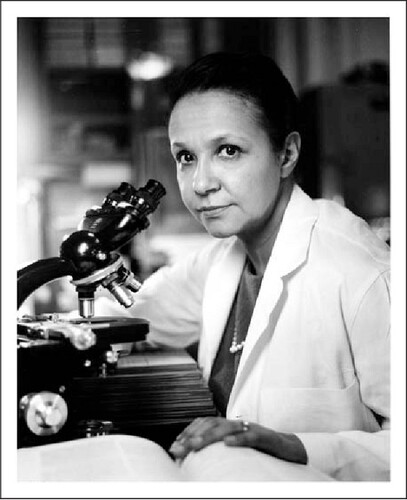27 Jane Cooke Wright
Dr. Jane Cooke Wright
|
 |
Time period:1919 – 2013 Subject:Medicine (Oncology) |
|
Biography:Born in New York City in 1919, Dr. Jane Cooke Wright was daughter to Dr. Louis Wright, who was one of the first African-American graduates from Havard medical school. Her father set a very high standard for her and her sisters. She graduated with honours from New York Medical College in 1945, interned at Bellevue Hospital from 1945 to 1946 in Internal Medicine, and then eventually completed her residency at Harlem Hospital as chief resident. In 1949, she joined her father, who was the director of the Cancer Research Foundation, at Harlem Hospital in cancer research, specifically in chemotherapy (anti-cancer drugs), which was groundbreaking at the time. While her father worked in the labs, she worked on delivering patient trails in cancer research. In 1952 after her father’s death, Dr. Jane Wright was appointed the first female head of the Cancer Research Foundation at the age of 33. In 1971, she was also the first woman to be elected president of the New York Cancer society. |
|
Summary of their contributions:Chemotherapy was groundbreaking at the time Dr. Jane Wright was researching it and she published many research papers on cancer chemotherapy. She is sometimes referred to as the Mother of Chemotherapy for her contributions to cancer research. Her work established the efficacy of methotrexate (a drug) in treating breast cancer and skin cancer. Dr. Wright also developed the technique of using human tissue culture rather than laboratory mice to test the effects of potential drugs on cancer cells. She also led teams of oncologists to China, the Soviet Union, and countries in Africa and Eastern Europe. Additionally, she led medical teams in 1957 in Ghana and 1961 in Kenya to provide medical/cancer care and education to other medical personnel. Furthermore, from 1973 to 1984, she served as vice-president of the African Research and Medical foundation. |
|
Integration with the BC Secondary Science Curriculum:In Anatomy and Physiology 12 (Bio 12), there is a unit on diseases, of which cancer is one, as well as a unit on DNA and gene expression. Her research could be discussed when talking about modern-day and historical treatments of cancer. Curricular competencies that could be used include:
|
|
References:Building Student Success – B.C. Curriculum. (n.d.). Curriculum.gov.bc.ca. https://curriculum.gov.bc.ca/curriculum/science/12/anatomy-and-physiology Mitchell, E. (2021, February 19). Remembering Jane Cooke Wright, a Black woman, who was among seven founders of ASCO. Cancer History Project. https://cancerhistoryproject.com/people/remembering-jane-cooke-wright-a-black-woman-who-was-among-seven-founders-of-asco/ National Library of Medicine. (2015, June 15). Changing the Face of Medicine | Jane Cooke Wright. Cfmedicine.nlm.nih.gov. https://cfmedicine.nlm.nih.gov/physicians/biography_336.html/ Thrasher, J. (2021, February 24). Celebrating Black History Month – Jane Cooke Wright | Molecular Biophysics and Biochemistry. Mbb.yale.edu. https://mbb.yale.edu/news/celebrating-black-history-month-jane-cooke-wright |
|

